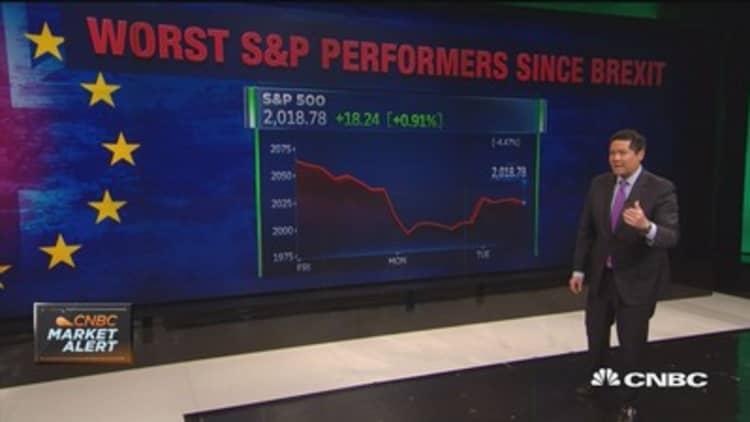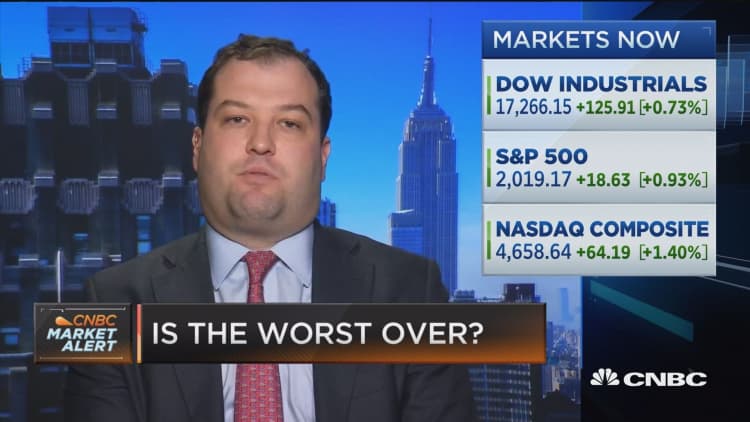


Stocks bounced back globally Tuesday and currencies steadied, but the Brexit-induced panic could come back in a flash, strategists say.
Global stocks lost a stunning $3 trillion in the two sessions following the United Kingdom's vote to leave the European Union Thursday. Markets steadied Tuesday, with equities gaining around the world, and bonds retreating from levels that sent yields to record or near-record lows.
"We have a stockpile of cash. We did not jump in. Sure there's opportunity, but I think when you strip away the headlines, the market is still relatively expensive," said Jack Ablin, CIO of BMO Private Bank. Ablin said he will give the market another look next week, after the three-day fourth of July weekend and Thursday's quarter end. "We think there could be some closing of positions and we could see some negativity going into the weekend."
The U.K. vote to leave the EU comes at an interesting time for markets, which are also dealing with the end of the second quarter in addition to the uncertainty in Europe. Some portfolio managers and pension funds must adjust holdings for the quarter end Thursday, and Wells Fargo strategists say that means some pensions will have to buy stocks and sell bonds after the whipsaw trading to rebalance their portfolios this week.
"The way the market is moving today is consistent with this kind of shift. We tend to think the Brexit story is not over," said Boris Rjavinski, director of rate strategy at Wells Fargo Securities. He estimates an unusually large $21 billion in U.S. large caps and international developed-market stocks could be purchased by pension funds to satisfy quarter-end asset allocation needs, and there could be outflows of $18 billion from U.S. bonds.
The U.K. story quieted in markets Tuesday, as investors watch the European leaders summit underway in Brussels. As the officials meet, volatile currency swings have temporarily subsided. The pound, down 13 percent since Friday, recovered slightly Tuesday but strategists expect more turbulence across markets as developments continue to unfold.
The S&P 500 was up more than 1 percent at midday Tuesday, at about 2,020. It had lost 5.3 percent Friday and Monday, settling at 2,000. The S&P, in a risk-on rally last week, had gained 2 percent before results of the Brexit vote were released in Britain early Friday morning.
"It really does take time for a lot of these trends to reverse. For the meantime, that does keep the risk-off flavor of the market in vogue here for the next couple of months," said Ari Wald, Oppenheimer technical strategist. "The seasonals are very poor for the S&P, more so as you get later into the summer. ... What has been a market of mixed trends, now we're seeing some of the breakdowns pick up."
US may be the world's best bet
Wald said the U.S. stock market is the best of the bunch globally. He said the S&P technically is meeting resistance at 2,025, an important level to cross above. On the downside, he said there could be support at 1,950.
"Conditions are actually much stronger now than they (were) at this point last year, so we're hesitant to get too downbeat on the market as well. Specifically, for the S&P 500, which has been one of the strongest benchmarks in the world, we see this as a non-U.S. story. Coming from the global portfolio point of view, if you want to own something we think you want to own the U.S."
Economists have said the U.K. action will have limited effect on the U.S. and perhaps shave 0.2 percent off growth in the next couple of quarters. However, the U.K. could fall into recession, and Europe could see growth slow, but not necessarily contract.
Still, the real impact will also play out over months and years, and there are many unknowns which could impact markets.
"We have to be prepared for more uncertainty and more volatility. I guess the bottom line is this is the domino that fell, and whether it's the first domino in a series or an isolated domino in Britain, we don't know yet," said Ablin. "It's like revisiting 2011 all over again. I would say of all of the exits the British is the cleanest because they don't have the currency. Once you get into a situation with a euro zone country that gets way more complicated."
There are nationalist movements in other countries, like France, and there is concern that other nations could vote at some point to leave the EU bloc or currency-linked euro zone.
It's going to be a slow moving train. It's calmed down for now — but it hasn't calmed down. (The markets are) on heightened alert, but unfortunately it's moving at the pace of policy, not at the pace of the markets.Jack AblinCIO, BMO Private Bank
The U.K. has yet to make a formal request to leave the EU, by invoking Article 50, and who will take over for outgoing Prime Minister David Cameron may not be clear until September. EU officials have said they will not negotiate the exit terms until the U.K. makes a formal request to leave, and Cameron has said that request will have to be made by his successor.
"It's going to be a slow moving train. It's calmed down for now — but it hasn't calmed down," said Ablin. "(The markets are) on heightened alert, but unfortunately it's moving at the pace of policy, not at the pace of the markets."
He said the U.S. stock market may be reflecting more a sell-off from overinflated values than fear about the impact of the U.K. exit.
"Valuations were stretched. So why would small caps be down twice as much as large caps in the U.S.? If you were really worried about Brexit interfering with global trade, you would think the multinationals would be down more than the insulated small guys. I think it was an opportunity to reassess valuations," he said. The small-cap Russell 2000 was down about 7 percent over Friday and Monday.
Wald said he would use market strength to sell the weakest links, and that means banks and European equities. The XLF Financial SPDR Select ETF was up 1.3 percent Tuesday but it's down more than 6 percent for the week to date. European banks, hit harder than U.S. counterparts, were also higher Tuesday.
"The weaker banks just can't find a floor globally. We say if you want to sell, you want to sell the weak technical trends. Of course, we have fallen a lot in a short amount of time. You could make the case we're oversold and bouncing back a little bit there," said Wald. He said on pullbacks he would look to buy market leadership, and he likes the iShares EDGE MSCI USA Momentum Factor ETF, MTUM.
"Where's the momentum right now? The momentum is in a lot of these lower-volatility stocks with bond-like characteristics that are doing well," he said, noting that Johnson & Johnson, United Health and AT&T have all been steadily rising.


